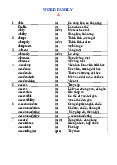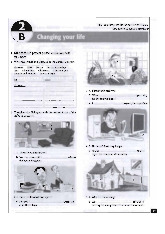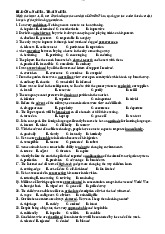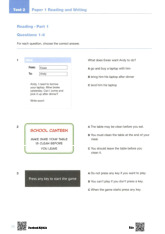





Preview text:
Đề 04 ĐỀ 4
Mark the letter A, B, C, or D on your answer sheet to indicate the word whose underlined
part differs from the other three in pronunciation in each of the following questions. 1. A. blind B. prioritize C. financial D. mobility 2. A. accessible B. experience C. special D. force
Mark the letter A, B, C, or D on your answer sheet to indicate the word that differs from the
other three in the position of primary stress in each of the following questions. 3. A. profile B. promote C. prefer D. regret 4. A. matchmaking B. teenager C. romantic D. reconciled
Mark the letter A, B, C, or D on your answer sheet to indicate the underlined part that needs
correction in each of the following questions. 5. Make
sure that you have the words spell correctly; otherwise, your form won't be accepted . A B C D 6. Almost
of the trees in this plantation have been cut down and burned. A B C D
7. Susan decided to not do her homework and went to a night-club. A B C D
Mark the letter A, B, C, or D on your answer sheet to indicate the correct answer to each of the following questions.
8. Could you please turn off the stove? The potatoes for at least twenty minutes. A. are boiling B. boiling C. were boiling D. have been boiling
9. I will not be here next week. I am going to be business in London. A. about B. in C. on D. at 10. Little
he know how much suffering he has caused. A. didn’t B. should C. won’t D. does
11. , he felt so unhappy and lonely. A. Despite his wealthy B. Rich as was he C. Rich as he was
D. In spite of his being wealth 12. All commuters
the main highway to get to the center of the city will face delay of
up to an hour today because of on-going construction. A. use B. used C. using D. will use
13. The world’s deepest cave, Pierre St. Martin in the Pyrenees Mountains, is almost three times .
A. as deep as the Empire State Building is
B. deeper than the Empire State Building is
C. is higher than the Empire State Building
D. as the Empire State Building’s height
14. Nowadays, most students use
calculators in their studies and examinations. A. electrical B. electricity C. electric D. electronic Trang 1
15. The Mountainview Hotel offers its guests a buffet breakfast every morning.
A. valuable B. situated C. dependent D. complimentary
16. Water is of two elements: hydrogen and oxygen. A. consisted B. composed C. making D. comprising 17. I want to
a table at the Bamboo Restaurant. A. maintain B. manage C. reserve D. allow 18. I can’t
this noise any longer. I’m going to write a letter of complaint about this problem. A. get back to B. take away from C. put up with D. make out of
19. People are always advised to
smoking because of its harm to their health. A. cut down B. cut off C. cut in D. cut down on
Mark the letter A, B, C, or D on your answer sheet to indicate the most suitable response to
complete each of the following exchanges.
20. Lan: Let’s go to the cinema this evening. Susan:
A. We don't have any film.
B. You went to the theater.
C. Let’s take the seat.
D. I’ve seen the film already.
21. “How lovely your pets are!” - “ ”
A. Thank you. It’s nice of you to say so.
B. Really? They are always very nice.
C. Can you say that again? D. I love them, too.
Mark the letter A, B, C or D on your answer sheet to indicate the word(s) CLOSEST in
meaning to the underlined word(s) in each of the following questions.
22. Within a week on display at the exhibition, the painting was hailed as a masterpiece.
A. a down-to-earth work of art
B. an excellent work of art
C. an expensive work of art D. a large work of art
23. Hypertension is one of the most widespread and potentially dangerous diseases.
A. stretchedB. popular C. common D. scattered
Mark the letter A, B, C or D on your answer sheet to indicate the word(s) OPPOSITE in
meaning to the underlined word(s) in each of the following questions.
24. We offer a speedy and secure service of transferring money in less than 24 hours. A. slow B. open C. unsure D. uninterested
25. “That is a well-behaved boy whose behaviour has nothing to complain about.” A. behaving nice B. behaving cleverly C. good behaviour D. behaving improperly
Mark the letter A, B, C, or D on your answer sheet to indicate the sentence that is closest in
meaning to each of the following questions.
26. I haven’t got enough money, so I’m not going on holiday.
A. If I have enough money I would go on holiday.
B. If I had enough money I would go on holiday.
C. If I had had enough money I would go on holiday.
D. If I have had enough money I would go on holiday.
27. The noise next door did not stop until after midnight.
A. The noise next door didn’t stop during midnight.
B. The noise next door stopped after midnight.
C. The noise next door didn’t stop after midnight.
D. The noise next door didn’t stop at midnight.
28. Nobody at all came to the meeting.
A. Not many people came to the meeting.
B. Not a single person came to the meeting.
C. Only a few people came to the meeting.
D. There was almost nobody at the meeting.
Mark the letter A, B, C, or D on your answer sheet to indicate the sentence that best combines
each pair of sentences in the following questions.
29. Many students like the lecture. Its subject is very interesting.
A. The subject of the lecture, which is very interesting, many students like.
B. The subject of the lecture, which many students like, is very interesting.
C. Many students like the lecture the subject of which is very interesting.
D. Many students like the lecture which subject is very interesting.
30. We had overslept. We missed the bus.
A. Having overslept so we couldn’t the bus.
B. Though we had overslept, we wouldn’t miss the bus.
C. If we hadn’t overslept, we wouldn’t miss the bus.
D. As a result of having overslept, we couldn’t catch the bus.
Read the following passage and mark the letter A, B, C, or D on your answer sheet to indicate
the correct word or phrase that best fits each of the numbered blanks from 31 to 35.
A Healthy Way To Know A City
Maybe you are staying in a city, and there is no park nearby where you can take your
morning job. One of the more recent trend is to go on a running tour, but you are not leading the
way. Rather, a running (31) _ who knows the best (32) in the city acts as
your guide. You are going out for a run, but you are also being shown highlights of the city while you are doing it.
Guided running tours are a trend that seems to be catching (33) in quite a few of
the bigger cities in the United States. New York City, Chicago, and San Francisco are just three
of the major cities that have running tours in (34) . They offer these tours to
individuals, groups, and even for corporate events. If you are going into a city with colleagues
to attend a business meeting or a convention, what better way is there to see the city and
network with others (35)
while taking a healthy run? 31. A. marathon B. sportsman C. enthusiasm D. enthusiast 32. A. ways B. routes C. directions D. approaches
BỘ ĐỀ THI THPT QUỐC GIA MÔN TIẾNG ANH Đề 04 33. A. on B. out C. up D. with 34. A. organization B. way C. place D. event 35. A. than B. even C. almost D. or
Read the following passage and mark the letter A, B, C, or D on your answer sheet to indicate
the correct answer to each of the questions from 36 to 42.
The World's Smallest Science
Have you ever noticed that our machines are getting smaller? Cell phones, cameras,
computers and everything else look smaller every year. One kind of new science involves
machines that are smaller than we can imagine. The name of this science is nanotechnology.
Nanotechnology means doing science, engineering, and technology at a very, very small
level. In other words, nanotechnology is the science of tiny things. But how tiny is the science of
nanotechnology? In nanotechnology, scientists work with things that are the size of a
nanometer. One meter has one billion nanometers. Here is another way to describe
nanotechnology: it is the science of observing and controlling individual atoms and molecules.
Nanotechnology is a new word, but the idea of studying atoms and molecules has existed
for a long time. In 1959, an American scientist Richard Phillips Feynman gave a speech in
which he claimed that we can see and control molecules and atoms. About ten years later, a
Japanese professor came up with the term “nanotechnology”.
Because nanotechnology is so new, we are only starting to understand how we can use it.
Nanotechnology could be very useful in medicine. In the future, doctors may use
nanotechnology to help with organ transplants. An organ transplant is the act of putting an
organ into another person's body. Scientists think that with nanotechnology, they might be able
to make a person's body accept a foreign organ. Nanotechnology might also help doctors fight
infections, find diseases in patients, and deliver medicine to the right spot in patients’ bodies.
Nanotechnology might also be useful in protecting the environment. It might be able to help
us save energy, reduce waste, and keep water clean. For example, nanotechnology might be able
to make some materials such as steel stronger. If we have stronger steel, we will be able to use it
longer. That way, we can produce less steel and save our resources.
Nanotechnology might be useful in so many ways. This science of studying tiny things could change the world.
36. Around what year did people start using the word “nanotechnology”? A. 1959 B. 1969 C. 1979 D. 1089
37. The word “which” in paragraph 3 refers to .
A. nanotechnology B. the speech C. atom study D. the article
38. What does the word “ ” in paragraph 4 foreign mean? A. Fake B. From another country
C. From another person’s body D. Real
39. What does the first sentence of the fourth paragraph mean?
A. Nanotechnology is new, so we are still learning about its uses.
B. Nanotechnology is not new, so we already know its uses.
C. We have no idea how we are going to use nanotechnology. Trang 4
BỘ ĐỀ THI THPT QUỐC GIA MÔN TIẾNG ANH Đề 04
D. We used to understand nanotechnology more than we do now.
40. According to the passage, what will nanotechnology NOT do? A. Find diseases B. Fight infections C. Reduce wastes D. Build organs
41. All of the following are the advantages of using nanotechnology in medicine EXCEPT that .
A. it helps doctors make and deliver medicine more accurately
B. it makes our bodies accept the organ transplants
C. it helps doctors prevent infectious diseases
D. it is also useful in medical examinations
42. Which statement is true?
A. The term “nanotechnology” is about 1900 years old.
B. The idea of studying atoms isn’t new.
C. A Chinese professor came up with the word “nanotechnology”.
D. Nanotechnology could be very useful in medicine.
Read the following passage and mark the letter A, B, C, or D on your answer sheet to indicate
the correct answer to each of the questions from 43 to 50.
Billboards that Recognize You
Have you ever felt you were being watched? Some new technologies might make you feel
that way. Digital billboards are being created that have the ability to recognize certain
characteristics. These high-tech devices have cameras pointed at the people on the street, and
software that tries to recognize people by age and gender. A computer inside the billboard then
uses this information to display ads that are directed at the people who are looking at the
billboard. For example, if a man passes a billboard featuring an ad for cosmetics, the computer
can change the ad to something that is more likely to catch the man’s attention, such as a restaurant, or sporting goods.
While advertisers see this as a great opportunity to reach their target customers, some
people feel that this kind of profiling is an invasion of their privacy. People are now much more
aware of how information is exposed, shared, bought, and sold on the Internet. Now this debate
will include technologies such as these “smart” billboards. But advertisers claim that they are
sensitive to people’s concern about privacy - companies that have tested the billboards in Japan
and the US assure consumers that the billboards can only guess your age and gender, but they
will not be able to recognize your face or obtain any personal information about you.
Until recently, this kind of “personal” advertising has been mostly limited to the Internet.
Search engines like Google and Bing can follow what we search for because each computer that
connects to those sites has a unique identity. Companies then pay search engines to use this
information to display ads for products and services that you have searched for. So if you search
for travel information, you are likely to see ads for airlines and hotels. This kind of advertising
has proven to be much more effective and valuable than traditional advertising.
In addition to taking steps to deliver more personalized messages, advertisers are using
billboards to offer more useful information. Digital billboards can connect to the Internet to
display information such as the time, weather, and news headlines. In the future, this Trang 5
technology could be used to reflect activity on social media sites or to broadcast ads that relate to local events.
In today’s world, people ignore thousands of ads every day. Advertisers are trying to change
that trend by personalizing the experience of seeing an ad. So pay attention the next time you
see a billboard - it could be talking to you.
Note: ad (n) = advertisement
43. What is another possible title for the passage?
A. The Dangers of Technology
B. Billboards: Past and Present
C. How Information Is Sold
D. A New Level of Advertising
44. What does a digital billboard’s camera look for?
A. a person’s fashion style
B. what a person is carrying
C. a person’s age and gender
D. whether someone is alone
45. What is the main idea of the second paragraph?
A. High-tech billboards do not collect personal information.
B. People do not mind the billboards tested in Japan and in the US.
C. Advertisers buy information about consumers on the Internet.
D. People are worried about the type of information collected by billboards.
46. The word “this” in paragraph 2 refers to . A. digital billboards B. digital advertising
C. customers' personal information
D. customers’ attention
47. Why does the passage mention Google?
A. It is an example of a search engine that sells information to companies.
B. It is better than other search engines in gathering information.
C. It has started using high-tech billboards to get information.
D. It plans to develop better ways to profile Internet users.
48. Because of advertising profiling, a person buying airline tickets online will .
A. see ads for hotels and car rental companies
B. get better prices on their airline tickets
C. see no ads on the airline’s website
D. be offered discounts on shoes and clothing
49. In the passage, the writer says that video billboards .
A. allow people on the street to use the Internet
B. show movies and commercials
C. display information about the weather and news
D. are placed inside stores and buildings
50. What is the reason for advertisers making high-tech billboards?
A. Regular billboards are not in good locations.
B. People ignore regular advertisements.
C. It is cheaper to make high-tech billboards.
D. People are suspicious of regular advertising.



